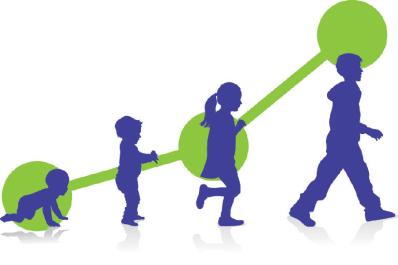Ages and Stages of Musical Development
Because music is part of our day to day life since birth, remember the thousands times you sang to your child when he/she was just a newborn, it can be hard to appreciate the many ways in which we observe, imitate, practice, make sense of, and enjoy our musical experiences. I found the breakdown by age provided by Jessica Baron Turner in her book "Your musical child: Inspiring Kids to Play and Sing for Keeps" to be a useful way to observe how musical development is made of areas or aspects that will emerge at various times.
Newborn to Year One
Hearing
- Newborn to 4 months: physically reacts to loud sounds
- 3 to 6 months: able to turn towards the source of sound and can respond to the sound of their name
- Able to identify mom and dad's voice
- 6 to 12 months able to respond to loud and quiet sounds, responds to familiar sounds (door bell, dog barking), babbling emerges and increases. Close to one year of age the ability to put sounds together in patterns emerges.
Musical awareness
- Respond to sounds and musical tones
- From six months onward will start to focus on the sounds they hear more frequently
- Find comforting the singing of their parents
Pitch development*
* Understood as the discrimination of sound in language and tones in music, as well and the ability to produce such
- Make sounds and start to make connections of pitch as it happens in language.
- Perceive and mentally organize music.
Rhythmic development
- Experience rhythm through rocking and bouncing
- Perform and experience rhythm through self-started and repeated large body movement
- Early development of a sense of inner pulse by physically with gentle touch marking the beat (tapping, patting, bouncing) on the infant's body while listening to music.
Instrumental development*
* Understood as the ability to make music whether with the human voice or a musical instrument.
- Curious about the sounds produced by percussion instruments
- Will engage in music making through imitation after being shown how to shake bells or tap on a drum
- Enjoy and responds to the sounds made by string instruments and piano
Cognitive development
- Studies show that participation of infants in frequent sing-song exchanges contribute to greater levels of linguistic and academic achievement later in life.
- Studies show that musical development in infants contributes to increase ability to problem solve. This may be explained by the stimulation of creative thinking in the infant through the wide range of vocal inflections they hear, interpret, and response to
One to Two Years
Hearing
- 12-15 months: the babbling produced by toddlers starts to resemble more and more speech
- 15-18 months: able to directly localize sounds
Musical awareness
- Able to discriminate dynamic changes (loud to quiet and vice versa, sudden loud, sudden quiet, etc.) in music
- Able to identify familiar tunes (favorite songs) and show excitement while doing so
- Respond to various music moods (jolly, scary, majestic)
Pitch development*
* Understood as the discrimination of sound in language and tones in music, as well and the ability to produce such
- Singing emerges and is often out of tune (inconsistent pitch accuracy)
- Sings usually randomly and repeating the same fragments from a song
- Experiments with pitch register (high/low) and vocal inflections with their growing use of language to express feelings and ideas through known songs and their own creations.
Rhythmic development
- Able to feel and move to a steady beat when performing large body movements (crawling, walking)
- Able to acquire a natural sense of tempo (speed of music) as they gain control over the pace at which they move
- Inner sense of rhythm is inconsistent: sometimes will tap on a drum keeping the beat sometimes the tapping will wonder away
Instrumental development*
* Understood as the ability to make music whether with the human voice or a musical instrument.
- Curious about the Able to independently hold and strike or shake percussion instruments (egg shakers, rhythm sticks, 3-bell jingle)
- Will engage in music making through imitation after beingAble to independently hold mallets in their hands and strike tuned percussion instruments (tone bells, glockenspiel, xylophone)
Composition/creativity
- Experiment with notes and melodies. This experimentation may include pitch register either as a stream of musical sequences or a single musical idea repeated over and over.
Cognitive development
- Starts to associate lyrics with melodies
- Songs become a primary source to gain general knowledge about the world at large
- Toddlers enjoy learning age-appropriate lessons through singing: from brushing teeth, to taking turns, to transitions
From the above breakdown, I would argue that when one focuses on musical development in a consistent manner other domains (physical, emotional, cognitive,etc) will also benefit at great lengths.
This is a unique feature of music-making: it touches all aspects of human development and its positive impact is long-term. Hence, music education is the "queen" activity that will allow parents to give the best opportunity to their children's development during the early stages in life.
I would love to read your thoughts. Was there anything surprising you did not know about musical development?
Happy reading and music-making until next time
Alicia Romero; B. Mus; M.Ed

This work is licensed under a Creative Commons Attribution-ShareAlike 4.0 International License.
